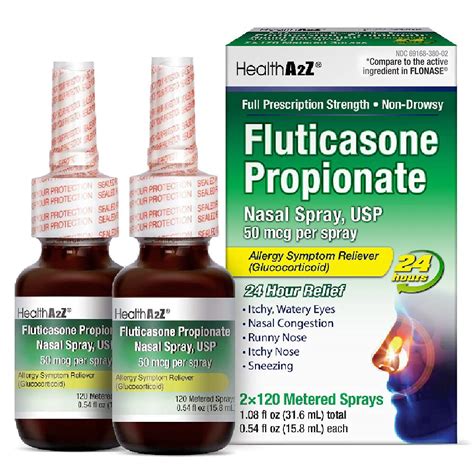Intro
Say goodbye to congestion and allergies with Fluticasone Nasal Spray. This effective treatment relieves nasal congestion, runny nose, and sneezing caused by allergies, colds, and sinusitis. Learn how Fluticasone works, its benefits, side effects, and usage instructions to breathe easy and live allergy-free. Discover the best solution for your nasal health.
Fluticasone nasal spray is a widely used medication for relieving nasal congestion, runny nose, and sneezing caused by allergies and other respiratory issues. The nasal spray contains fluticasone, a synthetic corticosteroid that works by reducing inflammation in the nasal passages. In this article, we will explore the benefits, working mechanisms, and proper usage of fluticasone nasal spray.
Understanding Nasal Congestion and Allergies
Nasal congestion and allergies are two common respiratory issues that affect millions of people worldwide. Nasal congestion occurs when the nasal passages become inflamed, causing swelling and increased mucus production. Allergies, on the other hand, are overreactions of the immune system to harmless substances like pollen, dust, and mold. When an allergen enters the nasal passages, it triggers an allergic reaction, leading to symptoms like sneezing, runny nose, and congestion.

How Fluticasone Nasal Spray Works
Fluticasone nasal spray works by reducing inflammation in the nasal passages, which helps to alleviate congestion and other allergy symptoms. When fluticasone is sprayed into the nostrils, it is absorbed into the nasal mucosa, where it begins to reduce inflammation and swelling. This leads to a decrease in mucus production, making it easier to breathe and relieving congestion.
Benefits of Fluticasone Nasal Spray
Fluticasone nasal spray has several benefits, including:
- Quick relief: Fluticasone nasal spray provides quick relief from nasal congestion and allergy symptoms, often within 24 hours of use.
- Long-lasting: The effects of fluticasone nasal spray can last for several days, making it a convenient option for people with chronic allergies.
- Easy to use: Fluticasone nasal spray is easy to use and can be administered directly into the nostrils, making it a convenient option for people of all ages.
Proper Usage of Fluticasone Nasal Spray
To get the most out of fluticasone nasal spray, it's essential to use it properly. Here are some tips:
- Shake well: Before use, shake the bottle well to ensure the medication is evenly distributed.
- Prime the pump: Prime the pump by spraying the medication into the air until a fine mist appears.
- Spray into the nostrils: Spray the medication directly into the nostrils, avoiding the eyes and mouth.
- Use as directed: Use fluticasone nasal spray as directed by your doctor or pharmacist, usually once or twice a day.
Common Side Effects of Fluticasone Nasal Spray
While fluticasone nasal spray is generally safe and well-tolerated, it can cause some side effects, including:
- Nasal dryness: Fluticasone nasal spray can cause nasal dryness, which can lead to nosebleeds and irritation.
- Headaches: Some people may experience headaches or migraines when using fluticasone nasal spray.
- Sore throat: Fluticasone nasal spray can cause a sore throat or coughing.

Precautions and Contraindications
Before using fluticasone nasal spray, it's essential to consider the following precautions and contraindications:
- Pregnancy and breastfeeding: Fluticasone nasal spray should be used with caution during pregnancy and breastfeeding, as it may pass into breast milk.
- Children: Fluticasone nasal spray should not be used in children under 4 years old, unless directed by a doctor.
- Other medications: Fluticasone nasal spray may interact with other medications, including immunosuppressants and certain antibiotics.
Alternatives to Fluticasone Nasal Spray
If you're looking for alternatives to fluticasone nasal spray, here are some options:
- Azelaic acid: Azelaic acid is a natural antihistamine that can help relieve nasal congestion and allergy symptoms.
- Saline nasal sprays: Saline nasal sprays can help moisturize the nasal passages and relieve congestion.
- Immunotherapy: Immunotherapy, also known as allergy shots, can help desensitize you to specific allergens and reduce symptoms.

Conclusion
Fluticasone nasal spray is a highly effective medication for relieving nasal congestion and allergy symptoms. By understanding how it works, its benefits, and proper usage, you can get the most out of this medication. Remember to always follow the instructions provided by your doctor or pharmacist, and consider alternatives if you experience any side effects or contraindications.
Call to Action
If you're experiencing nasal congestion or allergy symptoms, talk to your doctor or pharmacist about fluticasone nasal spray. Share your experiences with fluticasone nasal spray in the comments below, and don't forget to share this article with friends and family who may benefit from it.
FAQs
What is fluticasone nasal spray used for?
+Fluticasone nasal spray is used to relieve nasal congestion, runny nose, and sneezing caused by allergies and other respiratory issues.
How long does it take for fluticasone nasal spray to work?
+Fluticasone nasal spray can provide quick relief from nasal congestion and allergy symptoms, often within 24 hours of use.
Can I use fluticasone nasal spray during pregnancy?
+Fluticasone nasal spray should be used with caution during pregnancy, as it may pass into breast milk. Consult your doctor or pharmacist before use.

